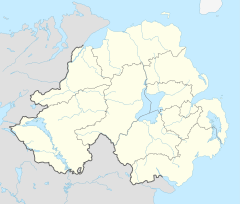| Derry / Londonderry | |
|---|---|
 From top, left to right: Austin's Department Store, Derry's Walls, Free Derry Corner, Peace Bridge across the River Foyle, a view of Derry at night, Diamond War Memorial, 'Hands Across the Divide' sculpture | |
 | |
Location within Northern Ireland | |
| Population | 2021 Census
[4][5][6]
|
| Irish grid reference | C434166 |
| District | |
| County | |
| Country | Northern Ireland |
| Sovereign state | United Kingdom |
| Post town | LONDONDERRY[7] |
| Postcode district | BT47, BT48 |
| Dialling code | 028 |
| Police | Northern Ireland |
| Fire | Northern Ireland |
| Ambulance | Northern Ireland |
| UK Parliament | |
| NI Assembly | |
Derry,[a] officially Londonderry,[b][8] is the largest city in County Londonderry, the second-largest in Northern Ireland[9][10] and the fifth-largest on the island of Ireland.[11] The old walled city lies on the west bank of the River Foyle, which is spanned by two road bridges and one footbridge. The city now covers both banks (Cityside on the west and Waterside on the east).
The population of the city was 85,279 in the 2021 census,[12] while the Derry Urban Area had a population of 105,066 in 2011.[13] The district administered by Derry City and Strabane District Council contains both Londonderry Port and City of Derry Airport. Derry is close to the border with County Donegal, with which it has had a close link for many centuries. The person traditionally seen as the founder of the original Derry is Saint Colmcille, a holy man from Tír Chonaill, the old name for almost all of modern County Donegal, of which the west bank of the Foyle was a part before 1610.[14]
In 2013, Derry was the inaugural UK City of Culture, having been awarded the title in 2010.[15][16]
- ^ a b Smyth, Anne. "Tha Yeir o Grace". Ullans (Nummer 11 Ware 2010). Archived from the original on 22 June 2018. Retrieved 22 June 2018.
- ^ a b Annual Report and Accounts for the period ended 31 December 2000 (PDF). The North/South Language Body. 2001. ISBN 010293133X. Archived (PDF) from the original on 6 December 2017. Retrieved 22 June 2018.
- ^ a b Smith, Clifford. "Ulster's Hiddlin Swaatch". Culture Northern Ireland. Nerve Centre. Archived from the original on 22 June 2018. Retrieved 22 June 2018.
- ^ "Census 2011 Population Statistics for Derry City Settlement". NISRA. Retrieved 16 August 2023.
- ^ "Census 2011 Population Statistics for Derry City Settlement". NISRA. Retrieved 29 September 2022.
- ^ "About The City". City Centre Initiative. Retrieved 29 September 2022.
- ^ "PostTowns by UK Postcode Area: 2007 information". Reigate, Surrey: Evox Facilities. 2007. Archived from the original on 23 July 2008. Retrieved 28 August 2008.
- ^ "Londonderry". Collins English Dictionary. HarperCollins. Archived from the original on 4 April 2018. Retrieved 4 April 2018.
- ^ "Derry/Londonderry". Breathing Places. BBC. Archived from the original on 21 October 2007. Retrieved 28 August 2008.
- ^ "The Communications Market 2007" (PDF). Ofcom.org.uk. Office of Communications. p. 14. Archived from the original (PDF) on 26 June 2008. Retrieved 28 August 2008.
- ^ "Regional City - Knowledge Corridor". Derry City Council. 2008. Archived from the original on 29 March 2010. Retrieved 1 November 2008.
- ^ "Get data for Sex (MS-A07) | NISRA Flexible Table Builder". Build or find Census 2021 tables. Northern Ireland Statistics and Research Agency. 2023. Retrieved 9 December 2023.
- ^ "Census 2011 Population Statistics for Derry City Settlement". NINIS: Northern Ireland Neighbourhood Information Service. Northern Ireland Statistics and Research Agency. 2022. Retrieved 12 November 2023.
- ^ Lacy, Brian (1983). Archaeological Survey of County Donegal. Lifford: Donegal County Council. p. 1.
- ^ "Londonderry named the UK City of Culture". BBC News. 15 July 2010. Archived from the original on 10 September 2010. Retrieved 15 July 2010.
- ^ Palmer, Robert. "The race is on to find UK's first 'City of Culture' for 2013". The National Archives. Archived from the original on 12 May 2010. Retrieved 15 July 2010.
Cite error: There are <ref group=lower-alpha> tags or {{efn}} templates on this page, but the references will not show without a {{reflist|group=lower-alpha}} template or {{notelist}} template (see the help page).
